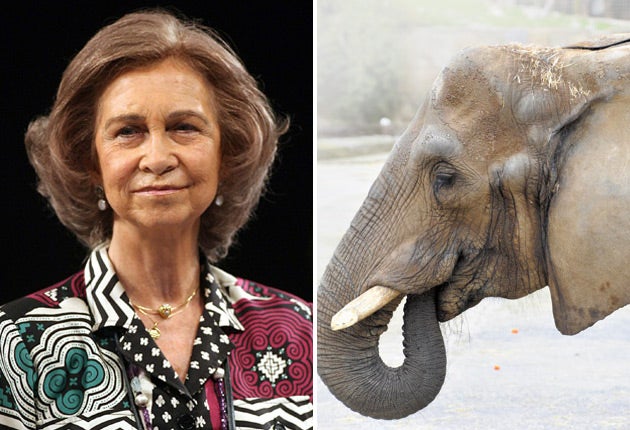Queen's trunk call gives depressed Susi new home

Susi the elephant is sad and bored. She paces to and fro in her small pen in Barcelona Zoo, swinging her head and trunk anxiously from side to side. She has even started eating her own faeces in stress and frustration.
Born free in Africa 36 years ago, Susi has been pining since Alicia, her female companion in captivity for more than six years, was put down a year ago suffering from intestinal colic. But this week an unlikely fairy godmother, in the shape of Spain's Queen Sofia, came to the rescue and transformed the plight of the bereaved elephant into an affair of the state. She has asked Barcelona's town hall, which runs the zoo, to find Susi a happier home.
Queen Sofia is known for her fondness for animals – she loathes bullfights – and her surprise intervention, reported in yesterday's El País newspaper, came in response to a desperate appeal from animal rights groups.
The Foundation for the Adoption, Sponsorship and Defence of Animals said it wrote to the royal palace on 12 February saying that Susi's life may be in danger if she continues to live at the zoo. Two weeks later, the royal palace replied, saying the Queen "regretted" the situation, and that they were writing to Barcelona's city hall. "The Queen is very sympathetic to animals," the foundation's president Carla Cornella said. "She wants to know what is the best situation for Susi."
Susi's behaviour testifies to her depression and boredom, according to animal rights group, Libera a Susi (Free Susi). She pesters visitors for food, consuming chorizo, crisps, plastic bags and whatever else her trunk scoops up. Because elephants are naturally vegetarian, this causes constant digestive problems. Gastrointestinal problems are among the most common cause of death of elephants in zoos, Free Susi says.
The group says that Susi, who came to the zoo in 2002, lives alone in a 1,000 square-metre concrete compound, while the European Association of Zoo and Aquariums recommends that elephants should live in herds, and in spaces of at least two hectares (five acres). "Susi is not well," Ms Cornella said. "If she stays there, she'll die."
The zoo says Susi is fine, and that it plans to settle her in a hectare of more natural habitat with a family of five or six other African elephants for company.
But the Free Susi association says she needs to be in a much more open environment than a zoo if she's to recover from her depression and live out her natural span of up to 70 years.
Campaigners believe zoo authorities might meanwhile bring in Yoyo, an African elephant who lives in the semi-wild near Tarragona, west of Barcelona, to keep Susi company, but they fear that the less institutionalised Yoyo might attack her.
The group has launched a campaign to move both animals to a reservation, either in Spain or abroad, with a habitat similar to their African origins, where they might roam free.
The Portuguese Nobel prize-winning novelist Jose Saramago has also visited Susi and taken up her cause. "She is dying of sorrow," says the writer whose latest novel The Elephant's Journey, about an elephant who travels across medieval Europe, is charging up the bestsellers' list.
Barcelona Zoo received more than a million visitors last year, and is the Catalan capital's most popular attraction after the Picasso museum. Susi has become the zoo's favourite animal, earning the kind of mass affection once showered on Snowflake, the world's only known albino gorilla, who died in Barcelona in 2003.
Join our commenting forum
Join thought-provoking conversations, follow other Independent readers and see their replies
Comments
Bookmark popover
Removed from bookmarks